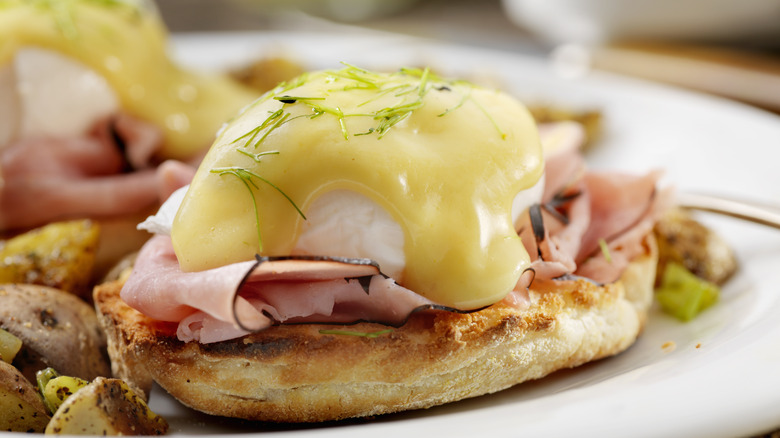The Longstanding Debate Over How Eggs Benedict Got Its Name
Eggs Benedict is a classic breakfast meal that can be found on many brunch menus. It's equally at home at an upscale restaurant or at a highway diner — it's the great equalizer. Not a whole lot is known about the exact origins of eggs Benedict. Because so little is known about how it came about, it's a bit of a spot of contention over brunch tables because there are several stories concerning just who is responsible for the classic eggs Benedict. Was it a hungover Victorian banker? Bored restaurant regulars? Or a commodore?
Located in Manhattan's Financial District, Delmonico's Restaurant is a city mainstay, having opened in 1837. It's famous for steaks and high-end lobster meals, but another claim to fame is inventing eggs Benedict – possibly. According to legend, around the 1860s, Delmonico's regulars Mr. and Mrs. LeGrand Benedict had eaten everything the menu had to offer and went off-menu, requesting something new be made. The chef, Charles Ranhofer, created eggs à la Benedick, which featured toast, ham, poached eggs, and Hollandaise.
Chef Ranhofer then went on to write a cookbook called "The Epicurean" published in 1893. Included in the book is a recipe for Delmonico's Eggs Benedict, called eggs à la Benedick, which calls for muffins to be cut in half and barely toasted, then topped with ham and kept warm until the eggs are poached, then covered in Hollandaise. An old menu from the restaurant says that it was created "at [Delmonico's] stoves in 1860," while their updated menu states it's the "original eggs Benedict."
Perhaps the dish was invented by the chef at Delmonico's in New York City
Around the same year Chef Ranhofer published his eggs à la Benedick recipe, a hungover Wall Street executive was looking for the best hangover remedy there is — greasy food. His name was Lemuel Benedict, and he ordered the meal at the Waldorf-Astoria Hotel in Manhattan, uptown from Delmonico's. In his hungover state, he described what he wanted, which was two poached eggs on buttered toast, with bacon and Hollandaise sauce. The maître d'hôtel, a fellow by the name of Oscar Tschirsky, zhuzhed it up a bit with an English muffin and Canadian bacon, but the name stuck.
It should be noted that Mr. Tschirsky worked at Delmonico's Restaurant for a period of time, perhaps at the same time as Ranhofer, before taking up the post of maître d'hôtel at the Waldorf-Astoria. Whether or not he had been aware of the existence of eggs à la Benedick is unknown, but Mr. Tschirsky had already put his mark on the dish, possibly along with Thousand Island dressing and Waldorf salad.
Or was it a commodore who invented the brunch classic?
The third and final contender for the inventor of eggs Benedict is a man named Commodore E. C. Benedict, who died in 1920 at the age of 86. According to The New York Times, Commodore Benedict was a banker and yachtsman who passed his recipe along until it landed in the lap of a nephew of a friend of the Commodore. In 1967, the nephew, Mr. Edward P. Montgomery, sent the recipe to the New York Times. In his letter, he stated that the Commodore's recipe is the true eggs Benedict, and what's served in America isn't worth the name of eggs Benedict.
The recipe differs quite a bit from what we know as eggs Benedict. It calls for one hardboiled egg that's been separated and finely chopped, then mixed with ham trimmings. This mixture is then mixed with the Hollandaise sauce and poured over the top of poached eggs on rounds of toast.
Could the dish have come from the kitchens of Delmonico's? Or is it the fevered brainchild of a hungover banker? It's fun to imagine any of the stories being true, like other juicy food origin stories, but we'll probably never know the real inventor. For your next weekend brunch, order or whip up a nice egg Benny and enjoy a lively debate on the merits of these legends.


